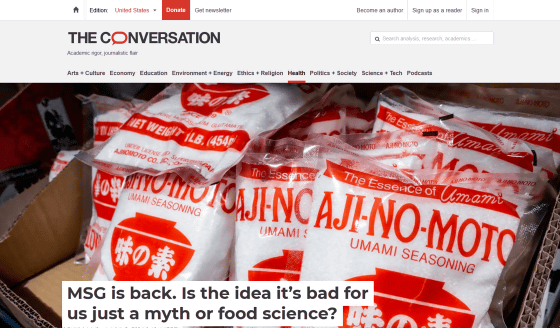Are umami seasonings really bad for your health?

By
Umami seasonings such as ' Ajinomoto ', which are used to add umami to dishes, are often criticized as being 'bad for health' while being used in various recipes. Evangeline Mantzolis, director of the Nutrition and Food Science Program at the University of South Australia, explains the question, 'Is umami seasoning really bad for health?'
MSG is back. Is the idea it's bad for us just a myth or food science?
https://theconversation.com/msg-is-back-is-the-idea-its-bad-for-us-just-a-myth-or-food-science-237871

Umami seasonings are seasonings that use glutamic acid , a type of amino acid. Glutamic acid itself is found in foods such as aged cheese, fish, beef, mushrooms, tomatoes, onions, and garlic, and gives them the flavor known as 'umami.' Because glutamic acid does not dissolve easily in water as is, sodium is added to make monosodium glutamate, which is used as an umami seasoning.
Umami seasonings have been used to flavor food for over 100 years, and were traditionally extracted from seaweed such as kelp, but at the time of writing, they are made by fermenting starch from sugar beets , sugar cane, molasses, etc. Both the glutamic acid found in natural foods and the monosodium glutamate found in umami seasonings ionize to form glutamate ions, and there is no chemical difference between them as umami components.

by
Food regulatory agencies in the United States, the European Union, Australia and other countries have recognized umami seasonings as a safe additive, and a major safety review by United Nations experts and the Federation of American Societies for Experimental Biology has also concluded that monosodium glutamate is safe for the general public.
In 2017, the European Food Safety Authority set a recommended intake of umami seasonings to prevent headaches and high blood pressure, but the upper limit is higher than most people's intake. According to this standard, a person weighing 80 kg should not consume more than 2.4 g of umami seasonings per day, but the average daily intake of Europeans is 0.3 to 1 g, and even Asians are 1.2 to 1.7 g per day. Unless you use a very large amount, there seems to be no risk of eating more than the recommended intake of umami seasonings.
Nevertheless, the idea that umami seasonings are bad for you persists. Its origins date back to a ' false letter ' published in the medical journal New England Journal of Medicine in 1968. The doctor who wrote this few paragraphs said that he experienced palpitations, numbness, and fatigue after eating at a Chinese restaurant, and suggested that the cause was the umami seasonings used in Chinese cuisine. Later, the New York Times published a follow-up article proposing the idea of ' Chinese food syndrome ,' which led to the widespread belief that umami seasonings are bad for you.

However,
However, as with most substances in the world, a small percentage of people may actually have a sensitivity to umami seasonings. Medically reported cases are known as the 'monosodium glutamate symptom complex,' but most symptoms are mild and require no treatment.
In a 1999 study of 100 asthma patients, 30 of the subjects considered themselves to be hypersensitive to umami seasonings during a preliminary survey. However, when subjects were given umami seasonings without knowing their contents, none of them reported any symptoms. In other words, if the subjects were not aware that they were consuming umami seasonings, they would not experience any symptoms.

Umami seasonings contain about one-third the sodium of table salt, so using them instead of table salt may help reduce overall sodium intake. In one study , people who drank soup seasoned with umami seasonings instead of salt reported that they reduced their sodium intake, even though they felt that the soup tasted salty.
'Unless you're one of the rare people with hypersensitivity, using umami seasoning to enhance the flavor of your food won't cause any health problems. It may help you use less salt. Vegetarians and vegans who can't eat animal products like meat, fish sauce, or cheese can add umami to their dishes,' Mantzolis said.
Related Posts:







